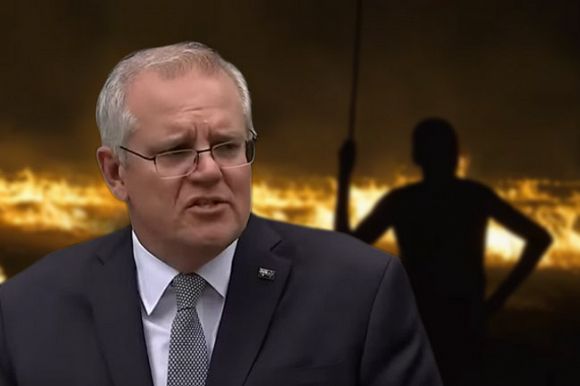Australian media is hyping up the startling loss of standing Prime Minister Scott Morrison and the Labor Party as, among other things, a vote for climate action.
There is no question that the pro-business slant of the Labor Party and the coal-wielding circus act of Morrison on the floor of the Parliament, have grown stale in the face of multiple climate-enhanced disasters that have crippled many regions of Australia. From disastrous bushfires to catastrophic flooding, climate change has reared its ugly head Downunder and it is not a pretty sight.
Interestingly, many aspects of this most recent Australian election parallel those that played out in the recent U.S. elections and signal how Australians can move forward on climate action.
In the U.S., we had the pro-business and anti-climate circus show that was Donald Trump against the “for the people“ Democrat Joe Biden. As a candidate in the early stages, Biden was not at all clear about prioritizing climate action, similar to Anthony Albanese and the Labor Party, who were largely silent about climate during the campaign.
In Biden’s case, he “saw the light” during the campaign after a concerted push by party progressives and the Green New Deal coalition forced him to bring climate action to the forefront of his policy agenda.
This is likely an artefact of the U.S. strict two-party system — here in Australia, it will be the voices of the Greens and "the teals" that will make climate action a policy priority. In both cases, there was a signal from a clearly climate-concerned electorate that something needs to be done quickly.
And it resulted in the bold statement by now-PM Albanese that:
“Together we can end the climate wars. Together we can… take advantage of the opportunity for Australia to be a renewable energy superpower.”
But Biden’s climate challenges show that it is not so easy to achieve these goals, a lesson from which Australians can learn.
Sure, the Biden Administration passed an absolutely monumental piece of infrastructure legislation, the “Build Back Better” framework, that confronts environmental justice and climate action. The largest funding bill of its kind, it pumps hundreds of millions of dollars into U.S. federal agencies to enact climate mitigation and adaptation actions across a range of industries.
This is all well and good, but it has ended up falling far short of the transformative action that needs to occur in the US for the critical systemic changes in energy infrastructure called for to reduce carbon emissions quickly.
The more ambitious climate legislation has stalled in the face of congressional pushback and multiple challenges confronting the country. Many of these challenges are shared in Australia and the world, with Russia’s attempted invasion of Ukraine shaking up the fossil fuel sector, and inflation and post-pandemic recovery painting a grim picture for the near future.
As Australians transition to new leadership, they should consider the short and long game on climate action, and avoid some of the climate roadblocks that have stymied Americans. For the short game, every action to reduce carbon emissions has that much more of a positive impact than delaying it until next year, or next decade, due to the accumulating nature of climate-controlling carbon in the Earth’s atmosphere.
And here is where market forces, and the providence of geography, literally shine on Australia. With solar photovoltaic installations pushing a nearly 40 per cent adoption rate on Australian residences, the country is taking advantage of its “sun-baked” reputation. This solar uptake is significantly aided by installation rates per watt that are one-third of those in the U.S., a market handcuffed by unnecessary steps and regulatory redundancies.
The wind potential is remarkable as well — particularly offshore production along Australia’s seemingly endless coastline.
And don’t buy into the “whataboutism” that delays climate action in the U.S. “What about when the Sun doesn’t shine and the wind doesn’t blow?” should be countered with “what about when climate-fueled bushfires destroy thousands of homes and livelihoods"?
Further, with enhanced distributed battery storage augmented by occasional supplementary consistent power generation – my only concession to natural gas facilities in areas without hydroelectric or other consistent electricity production – electricity production could be at least 90 per cent renewable by 2030.
Just keep the market in the picture and avoid obstructions to renewable build-out at local and national levels.
The long game on climate action for Australia rests in two sectors: transportation and export. These will be challenging to pull off, but certainly not impossible. The electric vehicle transition is very slow here in Australia compared to the U.S. and Europe, but is a better option here than everywhere considering the amazing synergy between residential photovoltaic (PV) production and residential storage.
Your EV is not just a mode of transport, but it is also a battery plugged into your solar array. This synergy provides a much more immediate and powerful way to transition away from internal combustion engines than can be achieved in most other countries with a much lower residential PV portfolio than Australia.
Urban sustainability expert Peter Newman of Curtin University has made a career of showing how just such synergies are achievable, and not sometime in the future, but now.
All the hype about hydrogen fuel for trains, trucks and ships speaks to the still-powerful voice of the fossil fuel industry here in Australia (and in the U.S., where this same scenario is playing out). Hydrogen is a high-power fuel ideal for heavy transport, but it is terribly tricky to store and ship and if it is produced from natural gas, as many of the fossil-backed projects are, you still have the climate problem.
And the hydrogen economy remains a bit of a pipe-dream, a tech solution that might prove central to climate solutions in a decade or two, but an easy way to distract from real action with long-term consequences. Like all serious solutions, the climate-forward answer for heavy transport is not simple and will likely involve some combination of reducing short- and medium-distance flight traffic, and hybridising trucks, planes and ships.
That leaves the trickiest part of Australia’s climate problem, the veritable "elephant in the room" that former PM Morrison famously brandished in Parliament: coal. In my travels around Australia, I have seen this elephant first hand — the line of coal barges waiting offshore to load up on Hunter Valley coal in Newcastle and WA coal to the west and Queensland coal to the northeast.
Going “net zero” in Australia refers to the internal balance of carbon and on this front more, and faster, climate action will promote a better future. But soon nearly all the coal mined in Australia will be burned elsewhere, mostly in the power plants of Asia.
Until this outsourced carbon footprint is dealt with, Australia still faces a climate reckoning. It has been argued by Saul Griffith and others that the real profits from Australian coal mining do not significantly accrue to real Australians, so why should the industry be protected as a mark of Australian identity?
The Liberal Party’s support of coal in all of its forms should go the way of former PM Morrison — booted to the curb in light of fact and for the benefit of future generations of Australians, and the vibrant ecosystems that make up this magical continent.
Dr Gabriel Filippelli is a biogeochemist with broad training in climate change, exposure science and environmental health. You can follow Gabriel on Twitter @GabeFilippelli.
Related Articles
- Morrison carted out in clean sweep as Albo ushered in
- Anthony Albanese defeats Rupert Murdoch to become 31st PM of Australia
- The ongoing media fixation on Albo’s ‘gaffe’
- The Albanese approach: How an unpopular plan has Labor on the verge of victory
- EDITORIAL:The Albanese approach: How an unpopular plan has Labor on the verge of victory
 This work is licensed under a Creative Commons Attribution-NonCommercial-NoDerivs 3.0 Australia License
This work is licensed under a Creative Commons Attribution-NonCommercial-NoDerivs 3.0 Australia License
Support independent journalism Subscribe to IA.














